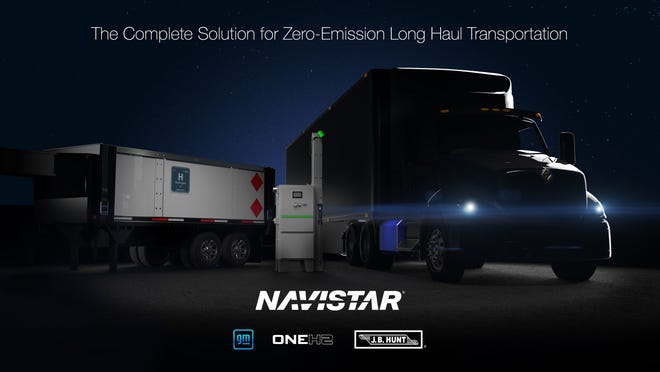General Motors’ transition to all-electric vehicles will transform the century-old automaker into a software company that just happens to make hardware: cars.
In the new business model, the cars will be a platform to deliver GM-developed software to offer consumers services beyond their vehicle. Services that can be used in their homes and other areas of their lives, GM leaders say.
It is “a potential game-changer for delivering subscription services that create recurring revenue,” said Alan Wexler, GM’s senior vice president of innovation and growth.
Wexler said over the coming weeks GM will share more details on how its software strategy is turning cars into devices.

“(It’s) similar to how you might think about your iPhone or Android phone,” Wexler said Wednesday at the Benzinga Electric Vehicle Investor Conference held virtually. “We’re working to create experiences and services, leveraging data in the vehicles and beyond the vehicles.”
The new business model is helping GM recruit and hire the top technology talent too, GM President Mark Reuss said Tuesday at the 2021 Mackinac Policy Conference on Mackinac Island.
“We’ve hired more people in the first half of 2021 than we did all in 2020 put together,” Reuss said. “Younger people and experienced people who want to be part of the revolution of what this transformation looks like are coming to our company to do it.”
Delivering desirability
Reuss said that in the past Silicon Valley and other tech types would have shunned the auto business, but now people understand that the car is a platform that delivers the software. “That’s very exciting to a lot of people who probably wouldn’t have thought about automotive in the past.”
In November, GM said it would hire 3,000 engineers, designers and technology specialists through the end of the first quarter, and most of those people can work remotely, opening up the talent pool across the nation.
GM did not immediately have its most current hiring numbers available.

Reuss said the technology on vehicles today such as advanced electrical power steering, brakes and GM’s Super Cruise hands-free driving technology are the basis to create the software “for the future growth of the company,” he said.
Beyond that, “We have to make cars like the (Cadillac) Lyriq that is off the charts in terms of desirability,” Reuss said. “We have to deliver things that people don’t even know they want yet in terms of connectivity, software and what it does to make their life easier and how it makes them feel when you drive that car.”

The 2023 Lyriq is an all-electric SUV due to market next year. Also going on sale later this year is the 2023 GMC Hummer EV pickup built in Detroit and Hamtramck at Factory ZERO. GM has said it will bring 30 new EVs to market by 2025.
More:Public to get a peek at GMC Hummer SUV EV at upcoming Motor Bella
“We can’t get to that opportunity of growth until we have cars that people want to buy, so that fundamentally has to be in place,” Reuss said. “Then we can deliver things that are sort of out of this world that people don’t even know they want.”
Planes, trains and automobiles
GM’s future rests on the technology it’s developing for its EV future such as the Ultium battery system. Wexler said Ultium is not just underpinning a wide variety of EVs across GM’s four brands, it also allows for partnerships such as one with Honda.
Around this time last year, Honda and GM formed a North American automotive alliance. In it, the two share a range of vehicles, to be sold under each company’s distinct brands, as well as cooperation in purchasing, research and development, and other connected services. The two can leverage their scale in buying supplies cheaper, saving each a lot of money. The Honda Prologue SUV EV is the first vehicle GM has developed with Honda. It goes on sale in 2024.
GM has also developed hydrogen fuel cell technology that has allowed it to partner with long-haul truck company Navistar Inc. and hydrogen provider OneH2 in January to develop a zero-emissions long-haul truck system across the United States.

In June, GM said it will engineer and supply its Ultium battery technology and its Hydrotec hydrogen fuel cell system to power locomotives in a collaboration with Wabtec Corporation, a company that provides equipment and other services to the freight and rail industry. Also in June, GM and Liebherr-Aerospace, an on-board aircraft system supplier, announced a partnership to develop ways to use hydrogen fuel cell power generation on an aircraft.
“We are rethinking the company and our future as a platform company. It goes beyond vehicles,” Wexler said. “There’s an opportunity to power planes, trains, automobiles and even beyond transportation.”
A big company, acting small
Going outside the vehicle, Wexler said GM is looking at revenue opportunities with subscription services like OnStar.
GM has said it will offer OnStar Insurance. The name comes from the brand GM uses on the safety-and-security communication system embedded in its vehicles. But GM is expected to sell its own insurance policies to all vehicles, including non-GM brands, and homeowners and renters insurance. Electric carmaker Tesla has sold auto insurance to its vehicle owners since 2019.
On Wednesday, GM announced OnStar Guardian skill for Amazon Alexa, a new feature that provides a voice-enabled connection to Emergency-Certified OnStar Advisors at home through compatible Alexa devices.
Finally, he cited GM’s new electric commercial van and software startup, BrightDrop. The company will deliver a low-volume amount of EV600 all-electric vans to its initial customer, Fedex, next year. It will also offer the EP1, an electrically powered pallet to move packages.

“We’ve tested it with FedEx already and proven an over 25% improvement in efficiency gain because we’re focusing not just on the van itself, but we’re developing a software solution around that and devices starting with the (EP1) to actually deal with the first and last mile,” Wexler said.
As GM’s self-driving subsidiary Cruise works on self-driving cars, Wexler said that will open more doors to invent new software or subscription possibilities.
“At some point riding in the back seat of a vehicle will be totally different from what it is today. In terms of software, services and experiences, we can deliver and create new experiences for people,” Wexler said. “That will be great for people but also will be great for business and we’re leaning into all of that. Running like a big company because we have the scale, engineering, people and culture. But also acting like a small company in how we think about developing software and services for the future.”
More:GM President Mark Reuss addresses idea of vaccine mandate, Flint’s future
Contact Jamie L. LaReau at 313-222-2149 or jlareau@freepress.com. Follow her on Twitter @jlareauan. Read more on General Motors and sign up for our autos newsletter. Become a subscriber.